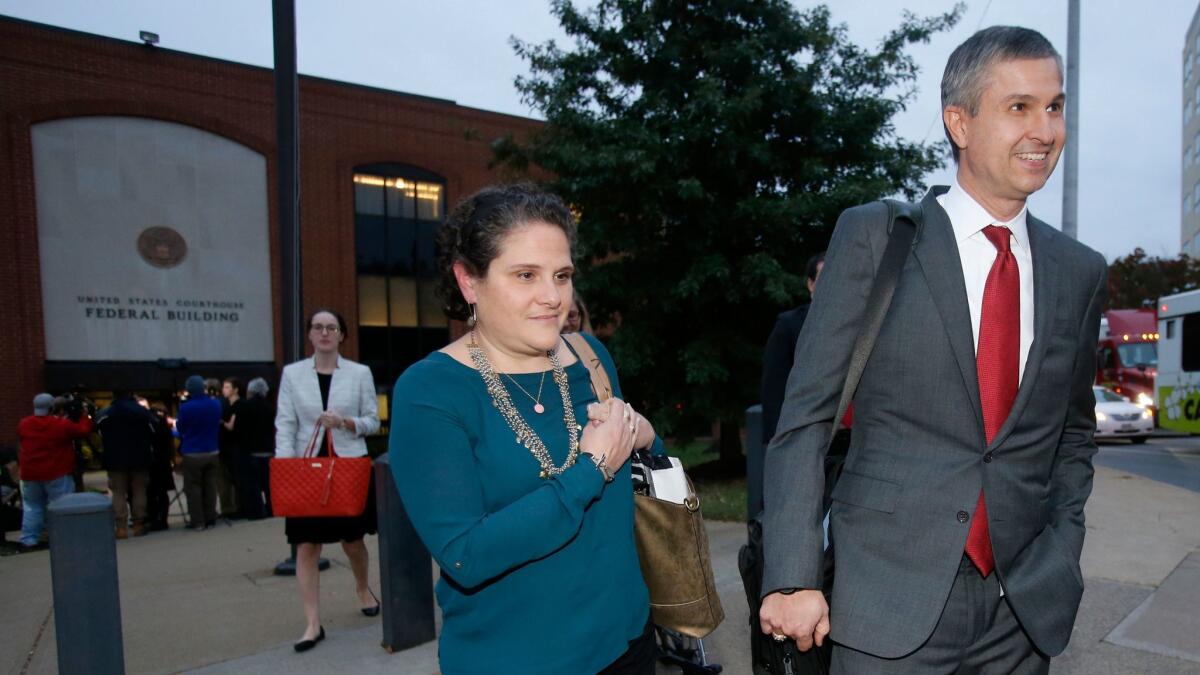Rolling Stone defamed University of Virginia administrator in rape story, jury finds

- Share via
A federal jury on Friday found Rolling Stone magazine, its publisher and a reporter defamed a University of Virginia administrator in a discredited story about gang rape at a fraternity house.
The 10-member jury found journalist Sabrina Rubin Erdely was responsible for libel, with actual malice. Jurors also said Rolling Stone and its publisher were responsible for defaming University of Virginia administrator Nicole Eramo.
Word of the jury decision came Friday afternoon in multiple news outlets.
Eramo claimed the 2014 article portrayed her as a villain who discouraged the woman identified only as Jackie from reporting the incident to police. A police investigation found no evidence to back up Jackie’s claims.
Rolling Stone’s attorneys said there was no evidence that the reporter knew what she was writing about Eramo was false or had serious doubts about whether it was true.
In a statement Friday, the magazine apologized to Eramo and anyone else impacted by the story.
“It is our deep hope that our failings do not deflect from the pervasive issues discussed in the piece, and that reporting on sexual assault cases ultimately results in campus policies that better protect our students. We will continue to publish stories that shine a light on the defining social, political and cultural issues of our times, and we will continue to seek the truth in every story we publish.”
Eramo was seeking $7.5 million from the lawsuit. Jurors will decide at a later date how much to award her in damages.
Rolling Stone has agreed to cover all of Erdely’s legal costs and any damages levied against her.
Jurors heard closing arguments Tuesday after listening to more than two weeks’ worth of evidence.
The story about Jackie’s assault set off a firestorm at the university and in schools nationwide. Eramo received hundreds of angry letters and emails calling her the “dean of rape,” among other things, and faced protesters outside her office. The story crumbled after other news outlets began asking questions and police found no evidence to back it up. The article was officially retracted in April 2015.
Over the course of the trial, the jury of eight women and two men watched 11 hours of video testimony, heard from a dozen live witnesses and examined nearly 300 exhibits.
At issue were three statements made about Eramo in the article and several comments Erdely made about the “university” and “administration” in media interviews before the article was retracted.
Among the statements in the article that Eramo claimed were defamatory was one in which she is quoted — through Jackie — as saying that the university doesn’t publish all of its statistics about sexual assault because “nobody wants to send their daughter to the rape school.” Eramo says that was fabricated by Jackie.
The judge earlier this week dismissed Eramo’s claim that the story, when taken as a whole, implied that Eramo was a “false friend” to Jackie. Rolling Stone had called that a “critical element” of her case.
Because the judge determined that Eramo was a public figure, she had to prove that Rolling Stone made statements with “actual malice,” meaning it knew that what it was writing about her was false or entertained serious doubts as to whether it might be true.
Eramo’s attorneys argued that Erdely came into the story with a preconceived story line about institutional indifference to sexual assault and intentionally disregarded statements and facts about Eramo that didn’t fit that narrative.
They claimed Erdely also ignored red flags about Jackie’s credibility, including the changing account of Jackie’s rape and her refusal to let Erdely talk to people who could corroborate her story.
Attorneys for Rolling Stone acknowledged that Erdely and her editors made serious reporting mistakes, but argued that there was no evidence they acted with actual malice.
The magazine’s attorneys said that Erdely and her editors had full faith in Jackie until they realized she no longer was credible in early December after the story was published.
ALSO
Two former Chris Christie allies convicted in New Jersey bridge scheme
Prosecutors charge former Playboy playmate Dani Mathers in gym ‘body-shaming’ photo case
What the WikiLeaks emails tell us about Hillary Clinton’s campaign (and what they don’t)
UPDATES:
12:05 p.m.: This article has been updated with a statement from Rolling Stone and additional details about damages.
This article was originally published at 11 a.m.
More to Read
Sign up for Essential California
The most important California stories and recommendations in your inbox every morning.
You may occasionally receive promotional content from the Los Angeles Times.









